 Teacher Feature...
Teacher Feature...
The Benefits of eBooks:
Learning With an Attitude!
by Glenn Dietzel, M.T.S. & M.Ed.
"It's not what you say, it's how you say it!" How often have we made this statement? Can you even begin to count the number of times you have countered a student's negative attitude with these immortal words? As we have used these learning situations with our students and children to discuss the importance of body language, eBook technology capitalizes on a similar learning experience in the digital domain. 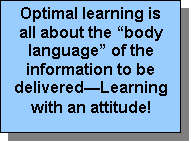 Optimal learning is all about the "body language" of the information to be delivered---Learning with an attitude! Optimal learning is all about the "body language" of the information to be delivered---Learning with an attitude!
Just as you enjoy dining out with your favourite person and expect your food to be presented in a favourable manner, which will only entice you to eat, the presentation of your knowledge is equally important--- and now doable with eBook technology. No more dependence on hard-cover and soft-cover text and work books. No more black and white pictures. No more black and white ink! Unleash the enhancements of your favourite word processing application and Adobe's publishing software, Adobe Acrobat, and your platter of knowledge, your eBook, will be a sight to behold---and to experience. Serve up your knowledge with all the pedagogical enhancements that eBook technology can offer.
What are the benefits of using eBook technology in the classroom? Many. eBooks allow for the transmission of current, up-to-date information. eBooks simulate our environment by mimicking our visual and interactive world. They facilitate the e-learning revolution. And they do this with pedagogical style, verve, and class!
This short article will demonstrate the overriding benefits of eBook technology--- portability, interactivity, and versatility. Although each of these domains will be treated separately, in reality they work synergistically one with another. 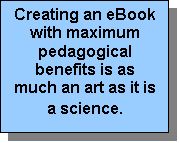 Creating an eBook with maximum pedagogical benefits is as much an art as it is a science. It is hoped that after reading this article that one will realize that "It's not what you say, it's how you say it!" that is of paramount importance. Creating an eBook with maximum pedagogical benefits is as much an art as it is a science. It is hoped that after reading this article that one will realize that "It's not what you say, it's how you say it!" that is of paramount importance.
Portability
eBooks can be transported at the speed of light (thank you fibre optic technology) any where around the world instantly. Saving an eBook on disk or CD after compressing it into a ZIP file can allow for the bundling of information into a mass of electrons being beamed across the Internet. No more heavy text books. No more articles and feature stories from chiropractors and the news media about concerns of heavy back packs. No, the information revolution that began with Gutenberg's print presses has released the confines of knowledge of traditional print format. Gutenberg's invention made storage and retrieval of knowledge easier, but printed material takes time to access---not easily updateable---and takes up physical space.
Information in the pre-knowledge era was confined to the printed page: it was locked-up in ink and paper. In the knowledge era, information is digital, which of course is essential for portability, interactivity, and versatility. 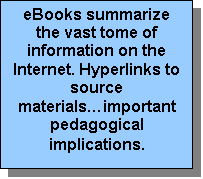 eBooks summarize the vast tome of information on the Internet. Hyperlinks to source materials makes their utilization of important pedagogical implications. eBooks summarize the vast tome of information on the Internet. Hyperlinks to source materials makes their utilization of important pedagogical implications.
What eBooks are not---They are not the digitalization of offline textbooks. Also, eBooks are not exactly the straight compiling of documents that you might have. No, eBooks are much, much more that this. It is the multiplicity of enhancements that you can add to your eBook which gives it it's true eBook nature.
The pedagogical benefits of eBooks greatly exceed the benefits of traditional text material. eBooks bring books to life! The ability to create hotspots (links or hyperlinks) can also allow the reader to access files created by other applications, forms, JavaScript commands and multimedia files such as movies and sounds. An eBook properly created can have all the functions of your web browser.
Interactivity
A huge benefit that eBook technology offers over traditional print is the interactivity of knowledge previously mentioned. eBook technology can add pedagogy to seven of the eight sub-intelligences of Gardiner's Intelligence Theory. 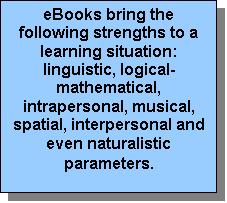 eBooks bring the following strengths to a learning situation: linguistic, logical-mathematical, intrapersonal, musical, spatial, interpersonal and even naturalistic parameters. These benefits will be brought out more fully in the following discussion on the enhancements that can be created in one's eBook using Adobe Acrobat. eBooks bring the following strengths to a learning situation: linguistic, logical-mathematical, intrapersonal, musical, spatial, interpersonal and even naturalistic parameters. These benefits will be brought out more fully in the following discussion on the enhancements that can be created in one's eBook using Adobe Acrobat.
Adding Colour
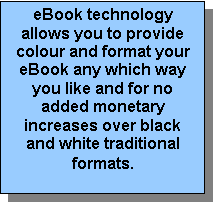 eBook technology allows you to provide colour and format your eBook any which way you like and for no added monetary increases over black and white traditional formats. Adding colour and interactivity does not require extra cost. With the editing tools found in Adobe Acrobat you can make your enhancements easily. eBook technology allows you to provide colour and format your eBook any which way you like and for no added monetary increases over black and white traditional formats. Adding colour and interactivity does not require extra cost. With the editing tools found in Adobe Acrobat you can make your enhancements easily.
Adding colour makes learning easier. Changing the color background (i.e. blue or black text on yellow background) can help students with low vision. Colour enhancements can be done easily. This allows large amounts of information to be sectioned more distinctly. Include links to source material on the Internet of pictures and diagrams and enhance your eBook even more.
The highlight tool on the Commenting toolbar allows students to practice highlighting important material. Students can practice picking out the key information and then summarizing these highlights into their own words using the Note tool. Or they can record their written summaries on a form pointed to the teacher's email address.
The pencil tool allows for students to circle and mark-up information. It also allows teachers to mark work that students send them online.
The strike-out tool is very useful in the editing phase of work. Students and/or teachers can strikeout material and include important material by using the "Note tool." Note tools and file attachments are also useful in the editing phase to add information that was left out or needs to be changed.
Font Size
Change the font size of your text and help students who are hard of seeing. Changing the font size of your eBook can also help you increase the readability of the text.
Change the column widths of your material for students. 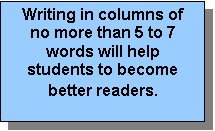 Writing in columns of no more than five to seven words will help students to become better readers. In today's high-paced information age, it is important to be a proficient reader. By manipulating the number of words to a line, this facilitates reading comprehension. Writing in columns of no more than five to seven words will help students to become better readers. In today's high-paced information age, it is important to be a proficient reader. By manipulating the number of words to a line, this facilitates reading comprehension.
Use software such as ACEReader to help students improve their reading rate and retention of information. Slow reading is the result of two main problems: re-reading and subvocalization. ACEReader is designed to help one overcome these problems, making one a more proficient reader while reading eBooks and other online material.
Sound Capabilities
Sound can be used for several key pedagogical benefits. You can create sound files so that students can play back the reading as they read a passage of text. You can also use sound files to give instructions for assignments. Students can play them back to review them.
Hot Spots and Bookmarking Capabilities
Imagine transporting back and forth across a book instantaneously. Imagine seeing all the chapter headings and key subsections always! Imagine using the Internet at the same time as you are reading thru a book. Impossible you might say? With eBook technology this is a realization. At the least, these features make navigating an eBook so much easier.
Forms
Adding forms to your eBook increases the involvement of students. Students can use this enhancement to complete answers from tests and/or assignments and then email them directly to their teacher(s).
Students can also use forms to complete projects over the Internet. Students can work collaboratively with their peers from other countries as they complete their assignments with an international flavor.
Movie Clips
You can't get more interactive and visual than the allowance of movie clips in your eBook. Creating hotspots (hyperlinks) to key movie clips will enhance the pedagogical nature of your eBook.
Formatting Considerations
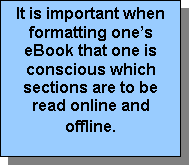 It is important when formatting one's eBook that one is conscious which sections are to be read online and offline. The sections of one's eBook to be read online should be formatted in the most pedagogically sound way using all the enhancement tools of Adobe Acrobat. The author can also be as creative as one would like to be. However, parts of the eBook to be read offline (if any), should be formatted to save space and hence paper, ink, and photocopying.
It is important when formatting one's eBook that one is conscious which sections are to be read online and offline. The sections of one's eBook to be read online should be formatted in the most pedagogically sound way using all the enhancement tools of Adobe Acrobat. The author can also be as creative as one would like to be. However, parts of the eBook to be read offline (if any), should be formatted to save space and hence paper, ink, and photocopying.
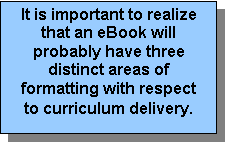 It is important to realize that an eBook will probably have three distinct areas of formatting with respect to curriculum delivery. Material intended to be read only by teachers can be formatted in the most efficient manner possible so that it can be printed in the fewest pages possible.
It is important to realize that an eBook will probably have three distinct areas of formatting with respect to curriculum delivery. Material intended to be read only by teachers can be formatted in the most efficient manner possible so that it can be printed in the fewest pages possible.
Sections of one's eBook to be read by students online should capture all the elements of one's web browser. Finally, the areas of an eBook meant to be printed out for students (i.e. BLMs) should abide by the same considerations as previously mentioned for teachers' offline reading.
Versatility
The prevalence of the World Wide Web in the middle of the nineties has transformed our society into an HTML-based communication society. Communication and many of our relationships are dependent on this language system. The problem with HTML is that it does not provide for compact, flexible and consistently produced "WYSIWYG" results between HTML creators (web designers) and the visitors to websites.
Web designers know that web browser differences can result in changes in their intended messages by altering their presentations---their designed pages. Remember the statement at the beginning of this article, "It is not what you say, it is how you say it!" Furthermore, differences in monitor settings of web viewers, makes for a less than dependent universal and consistent communication system. Adobe Acrobat is the answer as it is universal in conveying the intended message of the sender.
Adobe Acrobat allows for consistency of the intended message regardless of one's platform. This means that page layout, fonts, images, and colors are preserved giving the same look and feel as the authoring software's document. 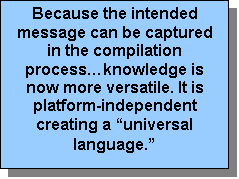 Because the intended message can be captured in the compilation process (compilation is the process of transforming your authoring application document into a PDF file---eBook), knowledge is now more versatile. It is platform-independent creating a "universal language." Because the intended message can be captured in the compilation process (compilation is the process of transforming your authoring application document into a PDF file---eBook), knowledge is now more versatile. It is platform-independent creating a "universal language."
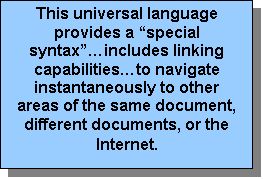 This universal language provides a "special syntax." This includes linking capabilities as previously mentioned where readers are able to navigate instantaneously to other areas of the same document, different documents, or the Internet. All this with a simple click on the proper hotspot.
This universal language provides a "special syntax." This includes linking capabilities as previously mentioned where readers are able to navigate instantaneously to other areas of the same document, different documents, or the Internet. All this with a simple click on the proper hotspot.
Bookmarks and a Table of Contents with each chapter title associated to its source material by a hotspot facilitate the versatile nature of eBook technology. Bookmarks also allow someone to see your Table of Contents at all times while reading your eBook, aiding the navigational process.
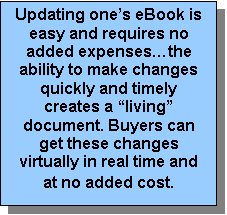 Updating one's eBook is easy and requires no added expenses. When compared with it's traditional offline counterparts, no expense is accrued to the author. Furthermore, the ability to make changes quickly and timely creates a "living" document. Buyers of eBooks can get these updated changes virtually in real-time and at no added cost. This feature give tremendous pedagogical value over traditional print formats, especially in curriculum areas where knowledge can go out of date in months, days, or even hours!
Updating one's eBook is easy and requires no added expenses. When compared with it's traditional offline counterparts, no expense is accrued to the author. Furthermore, the ability to make changes quickly and timely creates a "living" document. Buyers of eBooks can get these updated changes virtually in real-time and at no added cost. This feature give tremendous pedagogical value over traditional print formats, especially in curriculum areas where knowledge can go out of date in months, days, or even hours!
Body Language is Everything---Especially In The Digital Domain!
The method of communication is as important, if not more so, then the message conveyed. How we convey something is weighed against what we say. If our presentation is not congruent with the intent of our message, we fail to communicate to the degree our body language is out of sync with our message. Body language is everything. 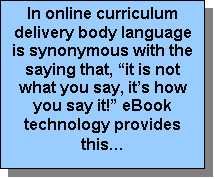 In online curriculum delivery it is synonymous with the saying that, "it is not what you say, it's how you say it!" Learning with an attitude! eBook technology provides the body language in the digital domain to provide tremendous pedagogical benefits to students. In online curriculum delivery it is synonymous with the saying that, "it is not what you say, it's how you say it!" Learning with an attitude! eBook technology provides the body language in the digital domain to provide tremendous pedagogical benefits to students.
© Copyright 2002 by Glenn Dietzel. All rights reserved. Used with permission.
| 
